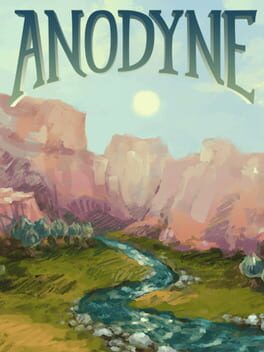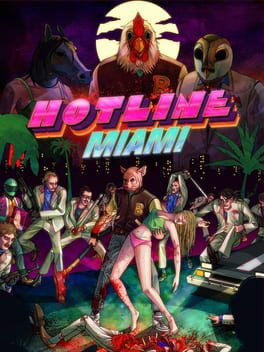TitaniaLowe
2013
2012
- Takes it upon itself to snub the idea that a game could be interested in anything other than gameplay
- Very much captures the worst of Pre-Gamergate white-male irreverence for the notion that video games should be treated critically
- Makes just enough smart artistic choices to get to pretend it's about American militarism or ""the consequences of your actions"" instead of what it's obviously actually about, which is how cool it is to wear a dog's head mask and eviscerate a guy with a golf club
- Punishes the emotionally invested player
- Actively insults any player interested in lore or coherent worldbuilding
- Treats its one female character as an object to be abused and then murdered to further the protag's blood craze
- Also, the developer sexually harasses women in real life
- Also also, I just don't find it fun
I don't understand why people celebrate this as one of the best indie games of all time and sometimes I feel crazy for disliking it as much as I do.
EDIT Feb 26 2023: I’ve never articulated it as such until now, but I feel confident concluding that Hotline Miami is a successful infiltration of fascist values into a language gamers circa 2013 were amenable to. Hotline Miami is a fascist game. Unfortunately - I am sorry but - I am not interested in explaining this assertion in any further detail in this space.
- Very much captures the worst of Pre-Gamergate white-male irreverence for the notion that video games should be treated critically
- Makes just enough smart artistic choices to get to pretend it's about American militarism or ""the consequences of your actions"" instead of what it's obviously actually about, which is how cool it is to wear a dog's head mask and eviscerate a guy with a golf club
- Punishes the emotionally invested player
- Actively insults any player interested in lore or coherent worldbuilding
- Treats its one female character as an object to be abused and then murdered to further the protag's blood craze
- Also, the developer sexually harasses women in real life
- Also also, I just don't find it fun
I don't understand why people celebrate this as one of the best indie games of all time and sometimes I feel crazy for disliking it as much as I do.
EDIT Feb 26 2023: I’ve never articulated it as such until now, but I feel confident concluding that Hotline Miami is a successful infiltration of fascist values into a language gamers circa 2013 were amenable to. Hotline Miami is a fascist game. Unfortunately - I am sorry but - I am not interested in explaining this assertion in any further detail in this space.
2001
This review contains spoilers
There was this shtick during the 2000s and early 2010s where “you were the bad guy the whole time!!!1!!! :O" was considered the peak of plot twists in video games. I feel like this game might have been the start of that, and one of the only games to do it "right". James Sunderland is a terrible person, but he has enough interiority and complexity to make spending ten hours weighing his guilt feel worth it. Watching him realize he killed his wife didn’t feel like I was forced into a shallow and masturbatory pornomisery about how terrible things happen to women; it felt like I was viewing a reasonable-if-incomplete contemplation on what should happen to violent people. That my partner and I disagreed on which of James' possible fates was most fitting convinces me even more that his story is one worth telling.
Of course, there should be some space to admit that at the end of the day Silent Hill 2 is a Fun Action Game. It’s a game that expects you to derive ludic satisfaction from hitting monsters with a blunt object until they die. And whatever Other Stuff the game lays on top of that, I feel like it all still plays second fiddle to Silent Hill 2, the game where you solve your problems with violence [1]. There is an effort to focus on the history of the town and the psychology of the protagonist; there is an effort to make clear that the game’s enemies are expressionist metaphors for inner demons and not the body of the Other; there is an effort to justify the events that happen on screen. But it’s never quite enough, and I wish the game stuck to its guns more instead of finding “good reasons” not to.
With that disclaimer out of the way - can we talk about how good the Other Stuff is??? I love how the town is just realistic enough to trigger the player’s memories of what apartments and hospitals are supposed to look like, but just dissociated and unclear enough with the fog and PS2 graphics to frustrate those projections. I love that the game is actively interested in the interiority of its characters, how they feel and why they act the way they do. I love that the game not only defends the right of games to talk about sensitive and important topics like trauma and abuse but does so in a mature and thoughtful way. I love that, however briefly, Mary gets a voice in what should happen to her murderer. I love that the game thinks that a person’s pain is important. I love that the game is actually scary (in places). I love that the game gets to be subtle.
I wish Silent Hill 2 had more of these things that I love. I wish the game spent more time with its secondary characters, especially Mary and Angela; I wish it was even more explicitly personal and psychological; I wish it rejected the imperative to be an action game instead of hand-wringing about it. Ultimately Silent Hill 2's biggest flaw is being a game chock full of some of the best ideas to come out of triple-A games that always stops just shy of really committing to any of them. But the first third of Silent Hill 2 is great, the last hour is lovely, and everything in between was eminently worth my time. So, alas; it is still an incredible game.
[1] And I am ofc being reductive here, if you are interested in this kind of argument then you should read/follow Liz Ryerson and Meg Jayanth.
Of course, there should be some space to admit that at the end of the day Silent Hill 2 is a Fun Action Game. It’s a game that expects you to derive ludic satisfaction from hitting monsters with a blunt object until they die. And whatever Other Stuff the game lays on top of that, I feel like it all still plays second fiddle to Silent Hill 2, the game where you solve your problems with violence [1]. There is an effort to focus on the history of the town and the psychology of the protagonist; there is an effort to make clear that the game’s enemies are expressionist metaphors for inner demons and not the body of the Other; there is an effort to justify the events that happen on screen. But it’s never quite enough, and I wish the game stuck to its guns more instead of finding “good reasons” not to.
With that disclaimer out of the way - can we talk about how good the Other Stuff is??? I love how the town is just realistic enough to trigger the player’s memories of what apartments and hospitals are supposed to look like, but just dissociated and unclear enough with the fog and PS2 graphics to frustrate those projections. I love that the game is actively interested in the interiority of its characters, how they feel and why they act the way they do. I love that the game not only defends the right of games to talk about sensitive and important topics like trauma and abuse but does so in a mature and thoughtful way. I love that, however briefly, Mary gets a voice in what should happen to her murderer. I love that the game thinks that a person’s pain is important. I love that the game is actually scary (in places). I love that the game gets to be subtle.
I wish Silent Hill 2 had more of these things that I love. I wish the game spent more time with its secondary characters, especially Mary and Angela; I wish it was even more explicitly personal and psychological; I wish it rejected the imperative to be an action game instead of hand-wringing about it. Ultimately Silent Hill 2's biggest flaw is being a game chock full of some of the best ideas to come out of triple-A games that always stops just shy of really committing to any of them. But the first third of Silent Hill 2 is great, the last hour is lovely, and everything in between was eminently worth my time. So, alas; it is still an incredible game.
[1] And I am ofc being reductive here, if you are interested in this kind of argument then you should read/follow Liz Ryerson and Meg Jayanth.


